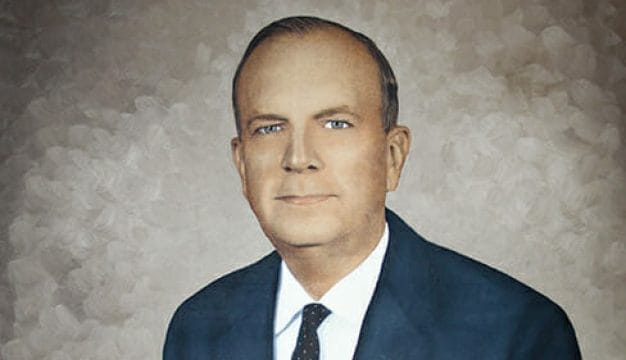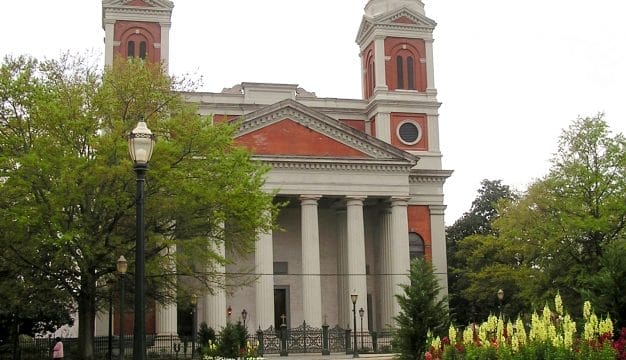Sonia Sanchez
Sonia Sanchez (1934-) is a poet who was born and lived her early years in Alabama. Growing up in Alabama greatly influenced Sanchez’s fascination with language and influenced her unorthodox style of poetics. She has produced more than a dozen books of poetry, all centered thematically on social injustices; in more recent years, her focus has expanded to include global concerns.
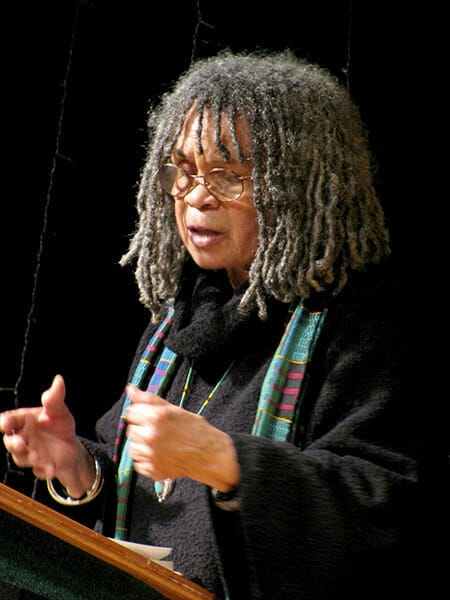 Sonia Sanchez, 2013
Sonia Sanchez was born Wilsonia Benita Driver on September 9, 1934, to Wilson and Lena Driver in Birmingham, Jefferson County. The middle of three children, Sonia and her family suffered several early traumatic experiences. When she was a year old, Sanchez’s mother died, and she developed a close relationship with her grandmother and became fascinated by the rhythms of her grandmother’s speech and regional dialect; she frequently tried to emulate these speech patterns in her poetry. Her grandmother died when Sanchez was six, and soon after, Sanchez developed a speech impediment that lasted until her later teenage years.
Sonia Sanchez, 2013
Sonia Sanchez was born Wilsonia Benita Driver on September 9, 1934, to Wilson and Lena Driver in Birmingham, Jefferson County. The middle of three children, Sonia and her family suffered several early traumatic experiences. When she was a year old, Sanchez’s mother died, and she developed a close relationship with her grandmother and became fascinated by the rhythms of her grandmother’s speech and regional dialect; she frequently tried to emulate these speech patterns in her poetry. Her grandmother died when Sanchez was six, and soon after, Sanchez developed a speech impediment that lasted until her later teenage years.
After her grandmother’s death, Sanchez’s father moved the family to New York City’s Harlem neighborhood, where she absorbed the African American culture expressed in the language she heard every day, attended jazz recitals with her father, and discovered her literary heritage by reading Zora Neale Hurston and Countee Cullen. Sanchez graduated from Hunter College in 1955 and then studied under poet Louise Bogan at New York University. Bogan’s influence, along with the music, literature, and the language she heard on the streets, inspired Sanchez to begin publishing her own poems in journals such as Negro Digest.
Sanchez’s poems typically center on women in general and African American women and life in particular through a heavy reliance on rhythm, sound, unusual stress patterns, hyphens, abbreviations, and audience interaction. Her formal career as a poet began with the publication of the politically charged Home Coming in 1969; the work was an attack on the exploitation of African Americans in racially charged America during the 1960s.
After a brief marriage (date unknown) to Puerto Rican immigrant Albert Sanchez (whose last name she kept), Sanchez married Etheridge Knight in 1968; they would have three children, Anita, Morani, and Mungu, but divorce by 1972.
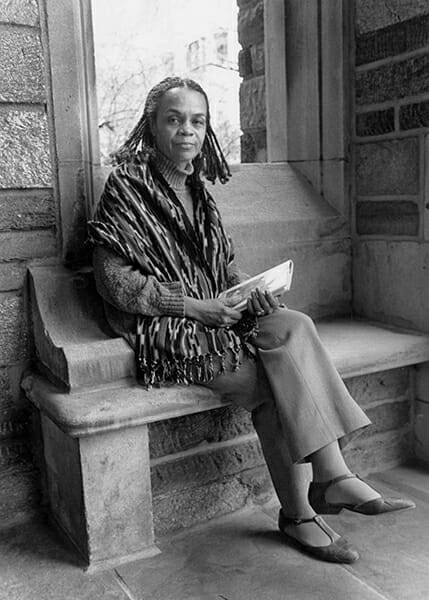 Sonia Sanchez, 1988
As her writing career began to blossom after graduating from college, Sanchez became involved in the civil rights movement. Her next book of poems, We a BaddDDD People (1970), and plays such as Malcolm/Man Don’t Live Here No More (1972), address the political and social oppression of the black community during the turbulent 1960s and always emphasize the performative aspect of language developed during her early years in Alabama. During Sanchez’s live readings, audiences would often clap along, shout responses to her verse, and applaud. Sanchez also began to look to her own life for poetic inspiration, motivated perhaps by her own struggles with married life, children, and the cultural turmoil she witnessed as a civil rights activist and writer. Later works, for example, such as A Blue Book for Blue Black Magical Women (1974) and Uh Huh, But How Do It Free Us? (1975) are often described as “spiritual autobiography” influenced by Sanchez’s involvement with the Nation of Islam and her own life.
Sonia Sanchez, 1988
As her writing career began to blossom after graduating from college, Sanchez became involved in the civil rights movement. Her next book of poems, We a BaddDDD People (1970), and plays such as Malcolm/Man Don’t Live Here No More (1972), address the political and social oppression of the black community during the turbulent 1960s and always emphasize the performative aspect of language developed during her early years in Alabama. During Sanchez’s live readings, audiences would often clap along, shout responses to her verse, and applaud. Sanchez also began to look to her own life for poetic inspiration, motivated perhaps by her own struggles with married life, children, and the cultural turmoil she witnessed as a civil rights activist and writer. Later works, for example, such as A Blue Book for Blue Black Magical Women (1974) and Uh Huh, But How Do It Free Us? (1975) are often described as “spiritual autobiography” influenced by Sanchez’s involvement with the Nation of Islam and her own life.
During this period, Sanchez taught at a number of different institutions, including the University of Pittsburgh (1969-1970); Manhattan Community College (1971-1973); Amherst College (1972-1975); and the University of Pennsylvania (1976-1977). In 1977, she took a position at Temple University, where she remained until her retirement in 1999. She remains a poet-in-residence at the school.
Although Sanchez gained notoriety for her live poetry readings, she was not recognized as a serious literary figure until the National Endowment for the Arts presented her with a fellowship in 1978. Her most famous book, Homegirls & Handgrenades (1984), is a collection of autobiographical poems. It won the American Book Award that same year. Other honors for Sanchez included an honorary doctorate from Trinity College (1988), the Distinguished Minority Faculty Fellowship at Delaware University (1987), an award from the Women’s International League for Peace and Freedom (1988), the Paul Robeson Social Justice Award (1989), and the Distinguished Poet-in-Residence at Spelmen College (1989). She also won the Roots Award from the PAN-African Studies Community Education Program (1993) and a Pew Fellowship in the Arts (1993). She received the Robert Frost Medal for contributions to American poetry in 2001, the Harper Lee Award from the Alabama Writers Forum in 2004, the Wallace Stevens Award from the American Academy of Poets in 2018, and a Lifetime Achievement Award in 2019 by the Cleveland Foundation.
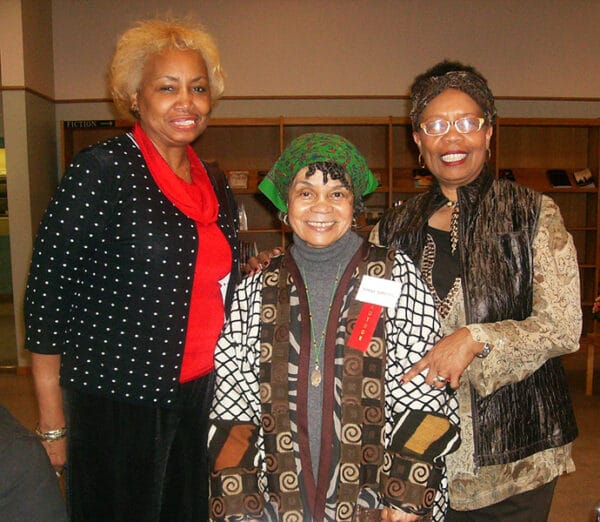 Sonia Sanchez, Linda Jones, and Evelyn Williams
In 2008, Sanchez was one of 20 African American women included in the traveling exhibit Freedom’s Sisters, a collaboration between the Smithsonian Institution and the Cincinnati Museum Center. The exhibit was mounted at twelve sites, including the Birmingham Civil Rights Institute, between 2008 and 2012. In 2012, Sanchez was named Philadelphia’s first Poet Laureate, serving until 2014. She was the subject of the 2015 documentary BaddDDD Sonia Sanches.
Sonia Sanchez, Linda Jones, and Evelyn Williams
In 2008, Sanchez was one of 20 African American women included in the traveling exhibit Freedom’s Sisters, a collaboration between the Smithsonian Institution and the Cincinnati Museum Center. The exhibit was mounted at twelve sites, including the Birmingham Civil Rights Institute, between 2008 and 2012. In 2012, Sanchez was named Philadelphia’s first Poet Laureate, serving until 2014. She was the subject of the 2015 documentary BaddDDD Sonia Sanches.
Although her literary focus has evolved over the years, Sanchez is still an advocate for peace and fair and equitable treatment of all peoples, evidenced especially in her later writings. In Shake Loose My Skin (1999), for instance, she relies heavily on repetition to celebrate African culture; in Like the Singing Coming Off the Drums (1998), she celebrates the power of healing and restoration. In her most recent work, Morning Haiku (2010), she celebrates life while also mourning the loss of revered African Americans such as Rosa Parks.
Selected Works by Sonia Sanchez
Home Coming (1969)
We a BaddDDD People (1970)
A Blues Book for a Black Magic Woman (1973)
Homegirls and Handgrenades (1984 – first edition)
Wounded in the House of a Friend (1995)
Does Your House Have Lions? (1997)
Like the Singing Coming off the Drums: Love Poems (1998)
Shake Loose My Skin (1999)
Conversations with Sonia Sanchez (2007)
Morning Haiku (2010)
Additional Resources
Bloom, Harold (ed). Black American Women Poets and Dramatists. New York: Chelsea House Publishers, 1996.
Davis, Elisa. “Lucille Clifton and Sonia Sanchez: A Conversation.” Callaloo 25 (Autumn 2002): 1038-74.
